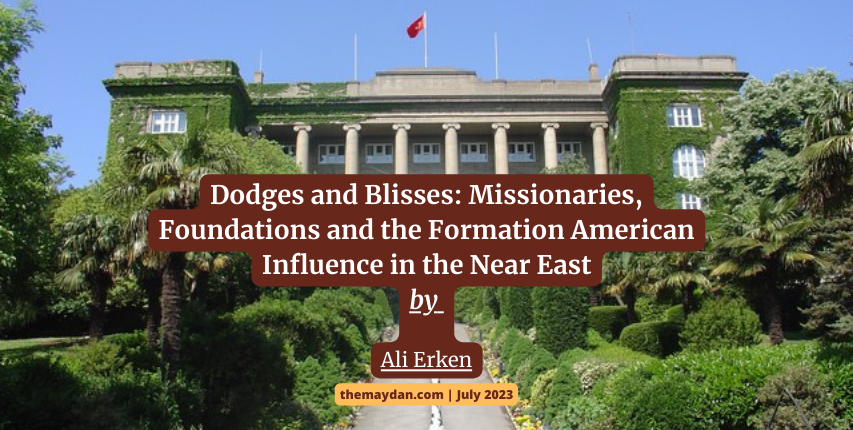
In 1863, Christopher Rhinelander Robert, a businessman dealing in local commerce, and Cyrus Hamlin, a missionary serving in Istanbul, collaborated to found the now-famous Robert College. Its name was taken from its benefactor, though it later enjoyed the support of various other funders, including the Dodge family and its scion William Dodge (1805-1883), who ran a successful railroad company and maintained a strong political network in New York while supporting missionary activities inside and outside the country. For missionary colleges of the Near East, the work of William Dodge, and in particular, his meeting with Daniel Bliss (1823-1916), would prove to be cornerstone developments.
Daniel Bliss was an American missionary from Georgia, who studied at Amherst College, and in 1855 sailed from Boston to Lebanon to start to work at a small missionary school. Bliss travelled back and forth to the United States, where he met William Dodge, himself a patron of the school. They formed a Board of Trustees, a school charter was established in New York, and finally in 1866, three years after Robert College, Syrian Protestant College was officially opened.
Daniel Bliss was trained in traditional missionary framework, but he applied a more flexible model of curriculum during his tenure in Syria and included some new courses in sciences and literature. The Syrian Protestant College, like Robert College, was not officially linked to the American Board of Commissioners for Foreign Missions, a status which afforded the College rulers some flexibility in running their affairs. A great majority of students both in Robert College and Syrian Protestant College came from non-Muslim minorities, ultimately forming a strong network of local elites from the Armenian, Assyrian and Greek communities. Graduates of these schools gradually assumed leading positions not only in politics, but also in the arts, literature and business. More than five Jordanian Primer Ministers, dozens of Ministers and Prime Ministers in Lebanon, the leaders of the Baath Party, and leading politicians in Iraq, Israel, Afghanistan and Iran were graduates of Syrian Protestant College.
Missionary Heritage and Colleges
The children of the Bliss and Dodge families continued missionary activities in the Near East in the early twentieth century. William Dodge’s son Stuart Dodge (1836-1921) became friends with Daniel Bliss, who convinced Stuart to go to Beirut to become an English teacher. After a stint in Syria, Stuart Dodge returned to the United States seeking to collect new funds for the school. He eventually became the President of the Board of Trustees of Syrian Protestant College. William Dodge’s other son, William Jr. Dodge, worked with Robert College and became one of the more prominent benefactors of the College.
Daniel Bliss’s son Howard (1860-1920) was born in 1860 while his father and mother were in Beirut, and spent most of his childhood in the region. Howard returned to the United States and, like his father, studied at Amherst College, before eventually joining the Union Theological Seminary.
Daniel Bliss’s son Howard (1860-1920) was born in 1860 while his father and mother were in Beirut, and spent most of his childhood in the region. Howard returned to the United States and, like his father, studied at Amherst College, before eventually joining the Union Theological Seminary. He went to Lebanon again in 1902 and replaced his father as the President of the Syrian Protestant College. Missionaries who were to serve in the Near East were understood to have grown up under the traditions of Amherst College and Union Theological Seminary. A majority of Robert College and Syrian Protestant College administrators were trained at these institutions, as well as at Princeton University, which gave them access to a wider network of elites in the United States.
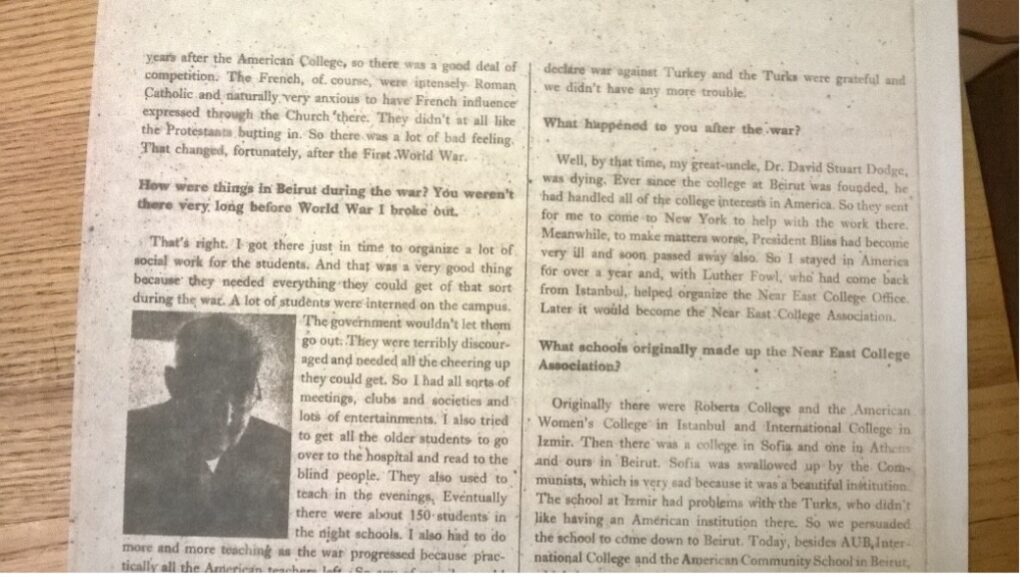
Howard Bliss steered the College through the turbulent years of the late Ottoman Empire, witness to the dissolution of the Empire and the formation of new nation-states. Bliss maintained a close connection with Cemal Paşa, the governor of the region, and used this relationship to protect the College until the end of the World War I. Bliss was also one of the participants in the post-war Paris Peace Conference. As part of his tenure, Bliss deployed a new approach in the missionary tradition, one that sought to merge traditional doctrinal missionary culture with modern expectations.
…it was Cleveland Dodge, William Dodge’s grandson, who served as the critical figure in the twentieth century development of Robert College and Near Eastern Colleges in general. In 1096, Cleveland Dodge was appointed Chairman of the Robert College Board of Trustees.
That being said, it was Cleveland Dodge, William Dodge’s grandson, who served as the critical figure in the twentieth century development of Robert College and Near Eastern Colleges in general. In 1096, Cleveland Dodge was appointed Chairman of the Robert College Board of Trustees. Using the family’s established political and economic influence in New York, Cleveland Dodge continued to support missionary organizations while maintaining the business activities he inherited from his family (The Dodge Hall in the Robert College Campus was one of the buildings constructed with the support of the family). He was a graduate of Princeton University, and made use of his circle of friends in his missionary activities. The most notable of these friends was Woodrow Wilson, who would later become President of the United States. Cleveland’s older sister, Grace Hoadley Dodge, was also appointed Chairman of the Board of Trustees of the American Girls’ College in Istanbul. Working in tandem, the Dodge family prioritized the training and well-being of non-Muslim minorities in the Ottoman lands, and led the establishment of Near East Relief (Near East Foundation), which provided health and food services as well as education for Christian groups, mainly Armenians and Assyrians, in the region.
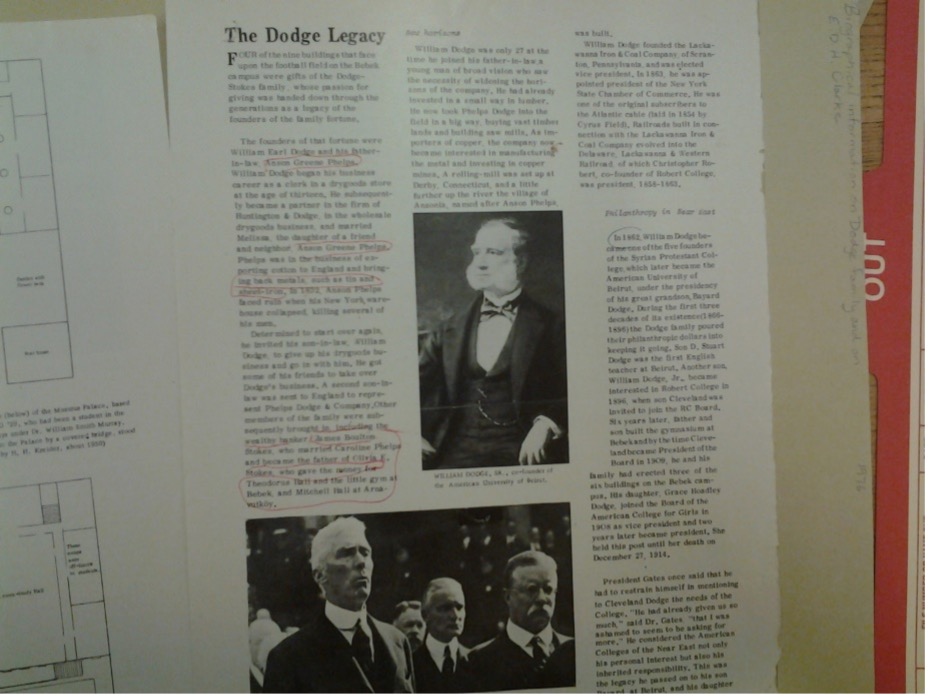
Cleveland Dodge collaborated closely with Caleb Frank Gates, who served as Robert College’s president between 1903 and 1932. Gates, like Howard Bliss, led the College during the difficult years of the Balkan Wars and World War I. He was not only in contact with Cleveland Dodge, but also with Howard Bliss, who was facing similar challenges in Beirut. Talat Paşa, who was then Prime Minister in Istanbul, and Gates maintained good relations, enabling the College to continue its activities. Like Bliss, Gates attended the Lausanne Peace conference after the Turkish War of Independence and exchanged his views with the representatives of Western Powers. Both Gates and Bliss benefited from Dodge’s close friendship with Woodrow Wilson as a shield for American missionary schools. After 1918 Gates was occupied with the transformation of the missionary college into a modern institution of education. After the dissolution of the Ottoman Empire and the formation of the Turkish nation-state, he corresponded with Cleveland Dodge, Howard Bliss and Bayard Dodge about general policies, and new social and political realities.
In 1899, Howard Bliss and Abby Maria Wood had a daughter, Marry Bliss, who was to marry Bayard Dodge (1888-1972), the son of Cleveland Dodge. After his graduation from Princeton University, like his father and father-in-law, Bayard Dodge travelled to Syria in 1913 to join the Syrian Protestant College. Bayard Dodge and Marry Bliss had met each other while in the United States and married before going to Syria. In 1923 Bayard Dodge replaced his father-in-law as the President of the College and remained there from 1923 to 1948. Bayard Dodge ruled the College during turbulent years of social and political change, led the foundation of Near Eastern Colleges Association, which would oversee financial and administrative works of the Colleges in the region. The Syrian Protestant College was transformed into the American University of Beirut in 1920, and gradually expanded its faculties through to the 1980s. Bayard Dodge was also a scholar of early Islamic history, and authored several books and articles on the early formation of Islamic societies. In the 1970s, his son, Stuart Dodge (1922-2009), who took on the name of his great-uncle, became actively involved in College affairs. Like his family elders, he graduated from Princeton University, joined the College’s Board of Trustees, and assumed the position of the College’s President. However, he was abducted by guerrillas during the Lebanese Civil War, then released after long negotiations, and he continued to work for the University until the early 2000s.
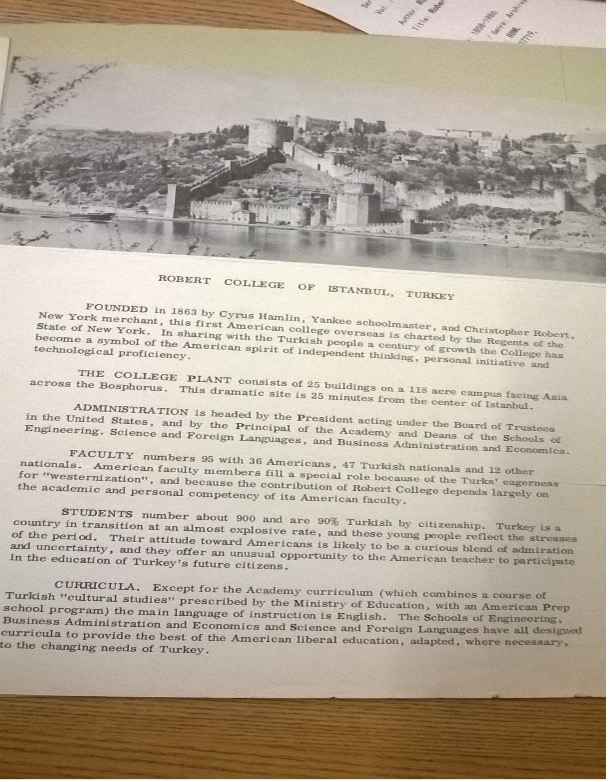
Elizabeth Dodge, one of the two daughters of Cleveland Dodge, started her missionary activities at a young age and, thanks to her father’s networks in Istanbul quickly became involved in Near Eastern Colleges. She married George Huntington, who served as vice president at Robert College, and travelled to Istanbul to join the Robert College staff. For more than 20 years, Elizabeth Dodge Huntington lived in Istanbul. Her father was still the President of the Board of Trustees and her aunt Grace was the President of the Board of Trustees of the American Girl’s College, who helped her establish a wide circle of friends within the non-Muslim minorities in Istanbul. Indeed, Grace Hoadley Dodge’s tenure at the Girls College, too, witnessed the transformation of the College during the Republican period, especially with an increase in the number of Turkish students.
Elizabeth was also actively engaged in YMCA activities to support Christian children in the region. They collected large amounts of support from churches in America and transferred them to Turkey. During the transformation of Robert College into a modern institution after 1945, the Dodge family’s involvement with the College gradually diminished. The Dodges maintained their interest in the colleges through their membership on the Board of Near Eastern Colleges and Robert College. It was not uncommon for them to attend events in the United States or Istanbul in the 1960s and 1970s, but they did not take official positions. In 1971 Robert College’s graduate division was transferred to the Ministry of Education in Turkey and Bogazici University was founded on the historical Robert College campus. Robert College, which is still affiliated to the Foundation Board in New York, continued its activities as a high school in its other campus, whereas Boğazici University as an independent institution has gradually transformed to a successful state university.
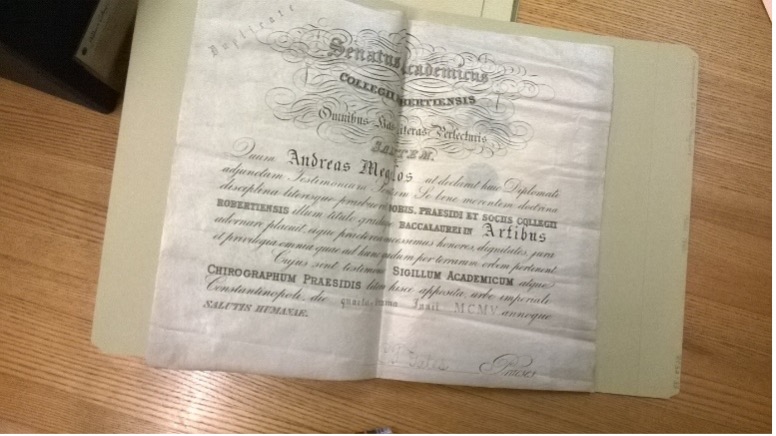
Robert College and American University of Beirut were patronized by these wealthy families prior to the involvement of the United States in the region on an economic and military level. Sailing between New York, Istanbul, and Beirut, the Dodges and Blisses built social, political and financial capital, establishing a nexus between education, foundations, and private enterprise, and utilizing the American foundation model to ensure continuity of tradition, institutional continuity, and knowledge transfer.
Both families prioritized Christian communities and paid less attention to the woes of Muslim communities in the early decades of the twentieth century, which helped them collect large donations from churches and other related associations in the United States. However, while they envisioned a more prestigious and commanding role for the non-Muslim minorities in society, they also held respect for the Muslim locals of the region. In the long-term, both Colleges aimed to stir a gradual change from within Muslim societies, precipitating the emergence of a new leadership among Muslim elites fully integrated with the Western lifestyle and institutions.
This goal seems to have been achieved, as many of the political leaders, artists, men of literature, and businessmen in the region graduated from these colleges; moreover, many Robert College and AUB graduates participated in the political leadership of various countries following the dissolution of the Ottoman Empire. The story of the Dodge and Bliss families offers an insight into the role of philanthropy and foundations in the evolution of Near Eastern societies since the mid-nineteenth century to the present day. Research on available archives would contribute to the understanding of human agencies beyond the state and politics-oriented approach to the region.

